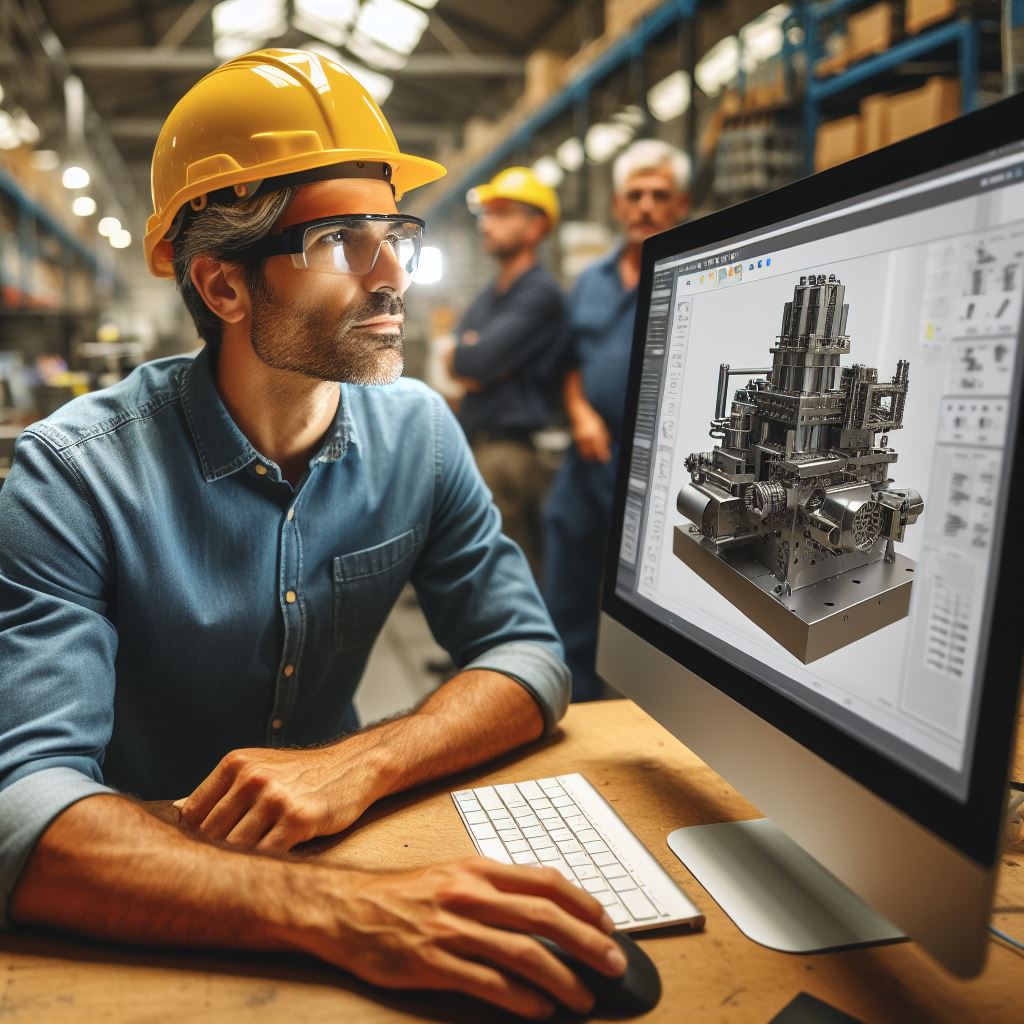Introduction
A. Importance of Mechanical Engineering in the Australian Job Market
Mechanical engineering stands as a cornerstone in Australia’s job landscape, driving innovation and progress across industries.
B. Brief Overview of Career Paths
- Design Engineering: Crafting blueprints for cutting-edge machinery and systems.
- Manufacturing Engineering: Streamlining production processes to enhance efficiency.
- Energy Systems Engineering: Pioneering sustainable solutions for power generation and consumption.
- Aerospace Engineering: Pushing boundaries in aviation and space exploration.
- Robotics and Automation: Revolutionizing industries through automated systems and artificial intelligence.
- Project Management: Steering large-scale engineering endeavors from conception to completion.
- Research and Development: Fostering breakthroughs by exploring new technologies and materials.
In this dynamic field, diverse career paths beckon, offering opportunities for innovation and impact in the ever-evolving Australian job market.
Overview of Mechanical Engineering in Australia
In this section, we will explore the definition and scope of mechanical engineering, the role of mechanical engineers in various industries, and the growth and demand for mechanical engineers in Australia.
A. Definition and Scope of Mechanical Engineering
- Mechanical engineering is a branch of engineering that deals with the design, construction, and operation of machinery and systems.
- It involves the application of physics, mathematics, and materials science principles to create mechanical devices.
- Mechanical engineers use their skills to design, analyze, and improve mechanical systems and processes.
- They work on a wide range of projects, including vehicles, power plants, HVAC systems, and manufacturing equipment.
B. Role of Mechanical Engineers in Various Industries
- Mechanical engineers play a crucial role in the automotive industry, where they are involved in designing and manufacturing vehicles.
- They work on developing fuel-efficient engines, improving vehicle safety, and enhancing overall performance.
- In the aerospace industry, mechanical engineers contribute to the design and maintenance of aircraft and spacecraft systems.
- They work on propulsion systems, structural design, and aerodynamics to ensure safe and efficient flight.
- Mechanical engineers also find employment in the energy sector, working on renewable energy projects and optimizing power generation systems.
- They contribute to the development of wind turbines, solar panels, and other sustainable energy technologies.
- Additionally, mechanical engineers are employed in the manufacturing industry, where they design and improve production processes and equipment.
- They focus on increasing efficiency, reducing costs, and ensuring product quality.
C. Growth and Demand for Mechanical Engineers in Australia
- The demand for mechanical engineers in Australia has been steadily increasing in recent years.
- This growth can be attributed to various factors, including infrastructure development, technological advancements, and population growth.
- The Australian government has invested heavily in infrastructure projects, creating opportunities for mechanical engineers.
- The need for sustainable energy sources and the focus on reducing environmental impact also contribute to the demand for mechanical engineers.
- Furthermore, the manufacturing sector in Australia continues to evolve and expand, creating job opportunities for mechanical engineers.
- The growth of industries such as automotive, aerospace, and renewable energy further drives the demand for skilled mechanical engineers.
- To meet the growing demand, universities and colleges in Australia offer comprehensive mechanical engineering programs.
- These programs provide students with the necessary knowledge and skills to excel in the field.
- Graduates can pursue careers in various industries, including automotive, aerospace, energy, and manufacturing.
- Additionally, mechanical engineers have the opportunity to work in research and development, pushing the boundaries of innovation.
In a nutshell, mechanical engineering offers a vast range of career paths in Australia. With a strong demand across industries and the continuous growth of the sector, aspiring mechanical engineers can look forward to promising opportunities.
Read: Australian EE: Industry vs. Academic Paths
Educational Requirements for a Career in Mechanical Engineering
In order to pursue a successful career in mechanical engineering in Australia, there are specific educational requirements that must be met.
These requirements include obtaining undergraduate degrees in mechanical engineering, fulfilling accreditation and professional registration requirements, as well as placing importance on continuous professional development.
A. Undergraduate Degrees in Mechanical Engineering
An essential step towards becoming a mechanical engineer is obtaining an undergraduate degree in mechanical engineering.
This degree program provides students with a comprehensive understanding of the principles and theories behind mechanical engineering.
During the course of their undergraduate studies, students will dive into subjects such as thermodynamics, fluid mechanics, solid mechanics, materials science, and mechanical design.
These diverse subjects equip students with a broad knowledge base to handle the challenges of a career in mechanical engineering.
B. Accreditation and Professional Registration Requirements
After completing an undergraduate degree, aspiring mechanical engineers in Australia must pursue accreditation and professional registration.
This process ensures that engineers meet specific standards and have the necessary skills and knowledge to perform their duties competently.
Accreditation is overseen by Engineers Australia, the nation’s peak engineering body. It involves providing evidence of qualifications, work experience, and professional references.
Accreditation allows engineers to use the title of “Chartered Professional Engineer” (CPEng), which enhances professional credibility.
Professional registration with the Professional Engineers Registration Board is another crucial requirement. This registration is a legal requirement in some states and territories in Australia.
It guarantees that engineers are competent and adhere to ethical and professional standards in their practice.
Your Personalized Career Strategy
Unlock your potential with tailored career consulting. Get clear, actionable steps designed for your success. Start now!
Get StartedC. Importance of Continuous Professional Development
In the dynamic field of mechanical engineering, continuous professional development is paramount to stay abreast of the latest advancements and industry best practices.
Engaging in ongoing education and training programs ensures that engineers are equipped with the skills and knowledge needed to succeed.
Professional development opportunities can include attending conferences, seminars, workshops, and taking part in professional societies and networks.
These activities facilitate the exchange of ideas, foster innovation, and encourage collaboration among mechanical engineers.
By continuously updating their skills and expanding their knowledge base, mechanical engineers can remain competitive in the job market and fulfill the evolving demands of the industry.
Additionally, ongoing professional development enhances career prospects and opens doors to higher positions and more challenging projects.
In fact, pursuing a career in mechanical engineering in Australia requires fulfilling certain educational requirements.
Obtaining an undergraduate degree in mechanical engineering is the first step, followed by accreditation and professional registration.
Continuous professional development is crucial to staying current in the field and advancing one’s career.
By meeting these requirements and emphasizing ongoing learning, individuals can embark on a successful and fulfilling journey in mechanical engineering.
Read: Emerging Tech Trends in Aussie EE

Career Paths in Mechanical Engineering
A. Design Engineering
- Design engineers are responsible for various tasks in the design process.
- Commonly used software and tools in design engineering include CAD (Computer-Aided Design) software.
- Design engineers can find employment in industries such as automotive, aerospace, and consumer electronics.
In the field of mechanical engineering, there are various career paths that professionals can pursue. One of the most common career paths is Design Engineering.
Design engineers are responsible for various tasks in the design process, such as creating and testing models, analyzing data, and developing prototypes.
They often use CAD (Computer-Aided Design) software and tools to facilitate the design process.
Stand Out with a Resume That Gets Results
Your career is worth more than a generic template. Let us craft a resume and cover letter that showcase your unique strengths and help you secure that dream job.
Get HiredDesign engineers can find employment in industries such as automotive, aerospace, and consumer electronics.
B. Research and Development
- Mechanical engineers contribute to Research and Development (R&D) projects to innovate new products or improve existing ones.
- Skills and qualifications needed for research roles include problem-solving, technical expertise, and analytical thinking.
- Examples of research areas and industries include materials science, robotics, and biomedical engineering.
Research and Development (R&D) is another exciting career path within mechanical engineering.
Mechanical engineers play a significant role in R&D projects, contributing to the innovation of new products or improving existing ones.
To excel in research roles, individuals need skills in problem-solving, technical expertise, and analytical thinking.
Examples of research areas and industries include materials science, robotics, and biomedical engineering.
C. Manufacturing and Production
- Mechanical engineers play a crucial role in various manufacturing processes, ensuring efficient production and product quality.
- Quality control and optimization techniques are implemented by mechanical engineers to improve production processes.
- Industries with significant manufacturing opportunities include automotive, aerospace, and industrial machinery sectors.
Manufacturing and Production is an essential aspect of mechanical engineering.
Mechanical engineers play a crucial role in various manufacturing processes, ensuring efficient production and product quality.
They utilize their knowledge in areas such as materials science, manufacturing techniques, and automation to improve production lines.
Quality control and optimization techniques are implemented to enhance the overall efficiency of manufacturing processes.
Industries with significant manufacturing opportunities include automotive, aerospace, and industrial machinery sectors.
D. Energy and Environmental Engineering
- Mechanical engineers in this field focus on developing sustainable and renewable energy sources.
- Contribution to reducing environmental impact is essential through the development of energy-efficient technologies.
- The green energy sector offers promising job prospects for mechanical engineers interested in environmental sustainability.
The field of Energy and Environmental Engineering has gained increasing importance due to the need for sustainable and renewable energy sources.
Mechanical engineers in this field focus on developing technologies and systems that harness renewable energy, such as solar and wind power.
They also contribute to reducing environmental impact through the development of energy-efficient technologies.
The green energy sector offers promising job prospects for mechanical engineers interested in promoting environmental sustainability.
Transform Your LinkedIn for Maximum Impact
Elevate your professional brand with a LinkedIn profile that attracts recruiters, showcases your expertise, and maximizes opportunities. Stand out in your industry with a profile built for success.
Boost ProfileIn short, mechanical engineering offers a wide range of career paths, each with its unique responsibilities and opportunities.
Whether it is Design Engineering, Research and Development, Manufacturing and Production, or Energy and Environmental Engineering, there are numerous avenues for mechanical engineers to contribute to various industries and make a significant impact.
It is essential for aspiring mechanical engineers to carefully consider their interests and skills to choose a career path that aligns with their goals and aspirations.
Read: EE Licensing in Australia: A Guide
Explore Further: Drafter’s Role in Australia’s Construction Boom
Skills and Qualities Required for Success in Mechanical Engineering
In the dynamic world of mechanical engineering, success hinges on a blend of technical prowess and soft skills.
Here’s a concise guide to the skills and qualities that will propel you forward:
A. Technical knowledge and proficiency in specific areas
- Mastery of core principles in thermodynamics, fluid mechanics, and materials science.
- Proficiency in CAD software for precise and efficient design work.
- Expertise in programming languages like Python for automation and simulations.
- Adeptness with advanced tools, such as Finite Element Analysis (FEA) and Computational Fluid Dynamics (CFD).
B. Problem-solving and critical thinking abilities
- Rapid identification of mechanical issues through analytical thinking.
- Innovative problem-solving, a cornerstone for designing groundbreaking solutions.
- Application of logical reasoning to optimize processes and enhance efficiency.
- The ability to foresee potential challenges and devise preemptive strategies.
C. Communication and teamwork skills
- Clear and concise articulation of complex technical concepts for diverse audiences.
- Seamless collaboration within multidisciplinary teams for holistic project execution.
- Active listening to understand project requirements and address client needs.
- Effective communication in both written reports and verbal presentations.
D. Adaptability and flexibility in a fast-paced industry
- Swift adaptation to evolving technologies and industry standards.
- Flexibility in handling diverse projects, from automotive systems to renewable energy.
- A proactive approach to continuous learning and skill development.
- Resilience in navigating the unpredictable landscape of the mechanical engineering sector.
As you embark on your mechanical engineering journey in Australia, remember: mastering these skills will not only open doors but also position you as a catalyst for innovation in this ever-evolving field.
Read: Networking Tips for Aussie EEs
Salaries and Job Outlook in Mechanical Engineering
A. Salary Ranges for Different Career Paths Within the Field
Mechanical engineering is a rewarding field that offers various career paths in Australia.
In this section, we will discuss salaries and job outlook in this industry.
1. Mechanical Engineer
- Entry-level positions: $55,000 – $75,000 per year
- Mid-career positions: $75,000 – $110,000 per year
- Senior-level positions: $110,000 – $150,000 per year
2. Project Engineer/Manager
- Entry-level positions: $60,000 – $80,000 per year
- Mid-career positions: $80,000 – $120,000 per year
- Senior-level positions: $120,000 – $160,000 per year
3. Design Engineer
- Entry-level positions: $55,000 – $70,000 per year
- Mid-career positions: $70,000 – $100,000 per year
- Senior-level positions: $100,000 – $130,000 per year
B. Factors influencing salary levels
- Experience: The more experience you have, the higher your salary is likely to be.
- Education: A higher level of education, such as a Master’s degree or PhD, can lead to higher salaries.
- Location: Salaries in major cities like Sydney and Melbourne tend to be higher due to the higher cost of living.
- Industry: The industry you work in can also impact your salary. For example, the mining and oil industry may offer higher salaries.
C. Overview of job opportunities and future outlook
- Job opportunities: The demand for mechanical engineers is expected to grow in the coming years. Industries such as manufacturing, construction, and renewable energy offer numerous job opportunities.
- Future outlook: With advancements in technology and the need for sustainable solutions, mechanical engineers will play a crucial role in developing innovative solutions. This will create a positive job outlook in the field.
- Specializations: Mechanical engineers can specialize in various areas such as robotics, aerospace, automotive, and bioengineering, opening up even more career opportunities.
In summary, mechanical engineering offers competitive salaries and a positive job outlook in Australia.
With the right experience, education, and specialization, you can expect to have a fulfilling career in this field.
Conclusion
Mechanical engineering offers a range of career paths in Australia to suit different interests.
Whether one is passionate about research and development, design, manufacturing, or energy systems, there is a pathway for everyone in this field.
For individuals considering a career in mechanical engineering, it is an exciting and rewarding profession that offers excellent job prospects and the opportunity to contribute to technological advancements and innovations.
As a final thought, it is important for aspiring mechanical engineers to stay updated with the latest industry trends, technologies, and advancements.
This can be done through attending conferences, workshops, and keeping in touch with professional networks.
If you are interested in pursuing a mechanical engineering career, the next step would be to research universities and institutions that offer programs accredited by Engineers Australia.
This accreditation ensures that the courses meet industry standards and will provide the necessary skills and knowledge to succeed.
In the end, a career in mechanical engineering in Australia opens up a world of possibilities and opportunities for individuals who are passionate about solving complex problems and making a difference in the world through innovation and technology.




